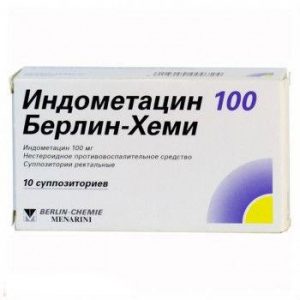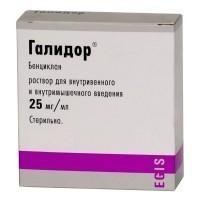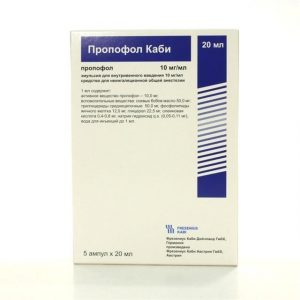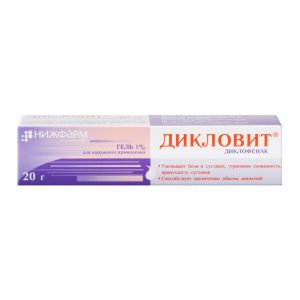Description
Description
Round biconvex tablets, film-coated in white, with NOVIGAN embossing on one side.
Cross-sectional view: white to almost white.
Latin name
Novigan
Release form
film-coated tablets.
Packaging
20 pcs
Pharmacological action
Pharmacodynamics
Combined drug, has analgesic, anti-inflammatory and antispasmodic effects. Suppresses the synthesis of prostaglandins (Pg). The composition of the drug includes a non-steroidal anti-inflammatory drug – ibuprofen, myotropic antispasmodic – pitophenone hydrochloride and m-anticholinergic agent of central and peripheral action – fenpiverinia bromide.
Ibuprofen is a phenylpropionic acid derivative. It has analgesic, anti-inflammatory and antipyretic effects. The main mechanism of action is the inhibition of the biosynthesis of prostaglandins – modulators of pain sensitivity, thermoregulation and inflammation in the central nervous system and peripheral tissues. In women with primary dysmenorrhea, it reduces the elevated level of prostaglandins in the myometrium, which reduces the intrauterine pressure and the frequency of uterine contractions.
Pitophenone hydrochloride, like papaverine, has a direct myotropic effect on the smooth muscles of internal organs and causes its relaxation.
Fenpiverinia bromide due to m-anticholinergic action has an additional relaxing effect on smooth muscles.
The combination of the three components of the drug leads to a mutual strengthening of their pharmacological action.
Pharmacokinetics
The components of Novigan ® are well absorbed in the gastrointestinal tract. The peak concentration in plasma is reached approximately 1-2 hours after taking the drug. The main component of the drug – ibuprofen is 99% bound to plasma proteins, can accumulate in the synovial fluid, is metabolized in the liver and excreted 90% in the urine in the form of metabolites and conjugates. A small part of the drug is excreted with bile. The plasma half-life is 2 hours.
Indications
Mild or moderate pain syndrome with spasms of smooth muscles of the internal organs: renal and biliary colic, biliary dyskinesia, intestinal colic.
Gynecological diseases: dysmenorrhea.
Headache, including migraine.
Short-term symptomatic treatment for joint pain, neuralgia, sciatica, myalgia.
Use during pregnancy and lactation
Contraindicated in pregnancy and lactation.
Special instructions
With prolonged use, it is necessary to control the picture of peripheral blood and the functional state of the liver and kidneys.
A minimally effective dose should be used to reduce the risk of gastrointestinal adverse events. When symptoms of gastropathy appear, careful monitoring is indicated, including esophagogastroduodenoscopy, a blood test with the determination of hemoglobin and hematocrit, an analysis of feces for occult blood.
If it is necessary to determine 17-ketosteroids, the drug should be discontinued 48 hours before the study.
During the period of treatment should refrain from drinking alcohol.
During treatment, the patient should refrain from engaging in potentially hazardous activities, requiring increased concentration of attention and speed of psychomotor reactions.
Composition of
Each film-coated tablet contains: Active ingredients: ibuprofen 400 mg,
pitophenone hydrochloride 5 mg,
fenpiverinium bromide 0.1 mg.
Excipients: microcrystalline cellulose 55 mg,
corn starch 76 mg,
glycerol 2.9 mg,
silicon dioxide colloidal 5 mg,
talcum 12 mg,
magnesium stearate 4 mg
sheath: hypromellose 6 cpsol6pp 6,616 mg 4616 mg mpg, 8,624 mg
talcum 1.957 mg,
titanium dioxide 1.059 mg,
polysorbate-80 0.058 mg,
sorbic acid 0.058 mg,
dimethicone 0.058 mg.
Dosage and administration
Inside, 1 hour before or 3 hours after eating. In order to avoid irritating effects on the stomach, you can take the drug immediately after eating or drink milk.
Unless specifically prescribed by a doctor, it is recommended that you take Novigan ® for spastic pain, 1 tablet up to 3 times a day. The maximum daily dose is 3 tablets. Do not exceed the indicated dose!
The course of treatment with Novigan ® without medical advice should not exceed 5 days. Longer use is possible under the supervision of a physician with control of peripheral blood counts and the functional state of the liver.
Side effects
At the recommended doses, Novigan ® does not cause side effects.
From the gastrointestinal tract: NSAIDs-gastropathy (abdominal pain, nausea, vomiting, heartburn, decreased appetite, diarrhea, flatulence, constipation of ulceration of the gastrointestinal mucosa, which in some cases are complicated by perforation and bleeding irritation, dryness of the skin, irritation, dryness, gingival mucosa, aphthous stomatitis, pancreatitis
From the hepatobiliary system: hepatitis
From the respiratory system: shortness of breath, bronchospasm
From the senses: hearing impairment: hearing loss, ph n or tinnitus on visual impairment: toxic lesions of the optic nerve, blurring of visual perception, scotoma, dryness and irritation of the eyes, swelling of the conjunctiva and age (allergic genesis), paresis of accommodation.
From the central and peripheral side. : headache, dizziness, insomnia, anxiety, nervousness and irritability, psychomotor agitation, drowsiness, depression, confusion, hallucinations, aseptic meningitis (more often in patients with autoimmune diseases).
From the cardiovascular system: heart failure, tachycardia, increased blood pressure.
From the urinary system: acute renal failure, allergic nephritis, nephrotic syndrome (edema), oliguria, anuria, polyuria, proteinuria, cystitis, staining of urine in red.
Allergic reactions: skin rash (usually erythematous or urticaria), itchy skin, Quincke’s edema, anaphylactoid reactions, anaphylactic shock, bronchospasm or dyspnoea, fever, multiform exudative erythema (including, Johnson syndrome) toxic epidermal necrolysis (Lyell’s syndrome), eosinophilia, allergic rhinitis.
From the hematopoietic organs: anemia (including hemolytic, aplastic), thrombocytopenia and thrombocytopenic purpura, agranulocytosis, leukopenia.
Others: Increase or decrease sweating.
From laboratory parameters: bleeding time (may increase), serum glucose concentration (may decrease), creatinine clearance (may decrease), hematocrit or hemoglobin (may decrease), serum creatinine concentration (may increase), hepatic transaminase activity (may rise).
If your medication has caused your normal condition to change, stop taking it and contact your doctor immediately.
Drug Interaction
At therapeutic doses, Novigan ® does not enter into significant interactions with commonly used drugs.
Inductors of microsomal oxidation enzymes in the liver (phenytoin, ethanol, barbiturates, flumecinol, rifampicin, phenylbutazone, tricyclic antidepressants) increase the production of hydroxylated active metabolites, increasing the risk of severe intoxication.
Microsomal oxidation inhibitors reduce the risk of hepatotoxic action.
Reduces the antihypertensive activity of vasodilators and the natriuretic effect of furosemide and hydrochlorothiazide.
Reduces the effectiveness of uricosuric drugs.
Increases the effect of indirect anticoagulants, antiplatelet agents, fibrinolytics (which increases the risk of bleeding).
Increases the side effects of mineralocorticosteroids, GCS (increases the risk of gastrointestinal bleeding), estrogens, ethanol enhances the hypoglycemic effect of sulfonylurea derivatives.
Antacids and cholestyramine reduce ibuprofen absorption.
Increases blood concentration of digoxin, lithium and methotrexate.
Enhances the action of m-cholin blockers, H1-histamine receptor blockers, butyrophenones, phenothiazines, amantadine and quinidine.
Simultaneous administration of other NSAIDs increases the incidence of side effects.
Caffeine enhances analgesic (analgesic) effect.
At the same time reduces the anti-inflammatory and antiaggregant effect of acetylsalicylic acid (possibly increasing the frequency of acute coronary insufficiency in patients receiving low doses of acetylsalicylic acid as an antiaggregant agent after starting Novigan ®).
Cefamandol, cefoperazone, cefotetan, valproic acid, plicamycin increase the incidence of hypoprothrombinemia with simultaneous administration.
Myelotoxic drugs increase the manifestations of hematotoxicity of the drug.
Cyclosporine and gold preparations enhance the effect of ibuprofen on GHG synthesis in the kidneys, which is manifested by increased nephrotoxicity. Ibuprofen increases the plasma concentration of cyclosporine and the likelihood of its hepatotoxic effects.
drugs blocking tubular secretion, decrease the excretion and increase the plasma concentration of ibuprofen.
Overdose
Symptoms: abdominal pain, nausea, vomiting, lethargy, drowsiness, depression, headache, tinnitus, metabolic acidosis, coma, acute renal failure, decreased blood pressure, bradycardia, tachycardia, atrial fibrillation.
Treatment: gastric lavage (only within an hour after ingestion), prescription of activated carbon, alkaline drink, forced diuresis, symptomatic therapy (correction of the acid-base state, blood pressure). A specific antidote to the drug does not exist.
Do not exceed recommended doses. If the recommended doses are exceeded, you should immediately consult a doctor or the nearest medical institution (you should have a package of the drug with you).
Storage Conditions
In a dry, dark place at a temperature not exceeding 25 ° C.
Keep out of the reach and sight of children.
Expiration
5 years.




